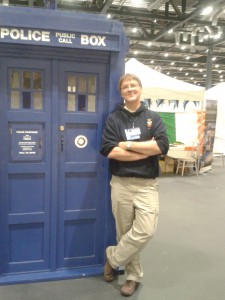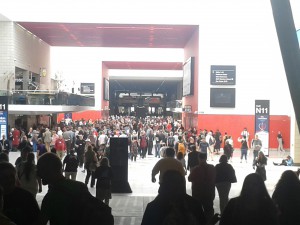Dear BBC. Or ITV, or indy production company, or whoever gets to make TV series in today’s post-regulated media world. Doctor Who is kind of successful for the BBC. I understand – though never watched it – that Primeval wasn’t bad for ITV, as far as wannabe clones of successful series go. Torchwood … let’s just say it found its way, eventually, but even at its best it was hampered like Pertwee’s first three years by being mostly present-day and Earthbound.
Why can’t we have a decent homegrown space opera again?
You see, I’ve been rewatching Blake’s 7 on YouTube. But not all of it.
First time round, I only ever got to see the first season. I was in my last year at prep school and we went to bed at – wait for it – eight o’clock. So, there was just time to squeeze in an episode once a week between end of prep and going upstairs. I still think of it in black and white. I started watching with the third episode, “Cygnus Alpha”, and was immediately hooked. (Terry Nation’s novelisation of the first four episodes later helped fill in the gaps.) I can still remember the first use of the teleport. Our heroes struggle with half understood technology on a stolen starship, so Blake materialises halfway up a slope and immediately tumbles backwards. Genius.
In those days, TV SF that wasn’t Doctor Who was original Star Trek or Space: 1999. Neither of those exactly pushed the boat out in terms of antagonism, anti-heroism, friction between the leading characters … all the things that made B7 fun. B7 was the first space show I saw where the good guys – well, the heroes – didn’t work for a uniformed organisation. Sure, the effects were risible, but not bad for what the Beeb could do in those days. And it’s not what you see, it’s what you remember. This is how Doctor Who and Star Trek made it big. You saw wobbly, cardboard sets and identikit alien planets – but you remembered epic battles across time and space.
And let’s not do the Beeb down. They had no money but a lot of vision. They made pioneering use of video effects with, for instance, the aforesaid teleport. Watch the last few minutes of “The Web”: Blake and Avon teleport out of the lab just as the little dwarfy creatures – I forget their names – break in and start wreaking havoc. It all happens in the same frame, at the same time. A dynamic, motion-filled scene. Mould-breaking stuff. The Beeb’s attitude to effects (and this goes back to Doctor Who, too) was that they knew what they could have done with a decent budget, unlimited time and state of the art equipment … so they went ahead with what they could and pretended that what they had done was what they had in mind.
The original Travis was a brilliant baddy, 30 years before the equally hissable, equally leatherclad Guy of Gisborne as played by Richard Armitage. And Servalan … Hmm. Yes, Servalan. I was entering adolescence in an all-male environment when she came along. Let’s just say I owe her a lot. (Her and Sarah Jane Smith, natch.)
But the first series, as I say, was all I saw. I then moved to big boys’ school, with no TV in the evenings except at weekends. So, I got a healthy dose of The Professionals but no more Blake, apart from the occasional episode snatched at half term or during the hols. Thus I got the start of the third season – exit Blake and Jenna, enter Dayna and Tarrant – and the end, with our heroes stranded on a hostile world as the Liberator disintegrates in orbit and Avon smiles. But that was it. I saw one, mid-run episode of the fourth season – the Headhunter one, just enough to leave me unimpressed with Scorpio as Liberator’s replacement, and wonder who Soolin was and where Cally had got to – and that was it.
The university sfsoc plugged a large hole in my knowledge with its end of term video weekends – the legendary Craig Hinton, in the days before shows were commercially available on VHS, somehow had a line into the heart of the BBC and what came out of it was pure gold, not just B7 but Doctor Who too. But even Craig only showed a couple of fourth season episodes. I don’t think he thought much of it either.
The fourth season was the season that should never have been. The series was all meant to end with the third – until the Head of BBC TV decided to uncancel it literally as the last episode was rolling, and the first anyone had heard of a fourth season came in a surprise continuity announcement immediately afterwards.
So the fourth season was the unplanned child, the one Mummy and Daddy never wanted or budgeted for. No more Liberator – our heroes are stuck on a broken down space freighter that makes the Millennium Falcon look swish. The same bloody sandpit, week in and week out for different alien worlds (even more so than before), none inhabited by more than three people. All the former spaces of Liberator compressed down to a single set on Scorpio because that’s all the budget could stretch to. Exit telepathic Cally, enter the somewhat bland but still gunslingin’ Soolin, who was never really given enough to do other than make up the numbers. Supercomputer Zen was blown to bits with the Liberator so replaced with the grovelling and deeply tedious Slave. Such are the budget restrictions that I’m pretty sure our heroes spend the entire series in the same outfits, apart from Soolin who manages one change. (Servalan continues to model a range of ever more setting-inappropriate glamourwear, and is no longer the scheming evil uberbitch of yore but the depressingly predictable surprise-surprise baddy each week.)
And so the fourth has a poor reputation, which may be why I never really bothered. Until just recently, my curiosity was piqued by Adventures with the Wife and Blake, and I snuck a look. And, you know what? The fourth season has been done down.
All the above points? Oh, true, all of them. That’s what I saw. But that’s not what I remember.
I can and will go further. The fourth season should have been the third. It broke the series out of a rut. No more smug swanning around the galaxy in their super-starship, tweaking Servalan’s nose, teleporting out of trouble and hitting Liberator’s go-faster button whenever a Federation pursuit ship hoves into view. Nope: right from the start, our heroes have lost everything and they keep losing. Avon gets madder and madder. Their situation grows more and more hopeless. The whole dynamic has changed. But there is still a feeling of continuity. Life has moved on and our heroes are having to move with it. All the way to the final, Hamletesque five minutes of the very last episode …
The attitude extended into the look of the programme. There was variety. Sometimes – literally only once or twice – we got to see Scorpio landing or taking off. It wasn’t just the teleport all over again. A story should be more than just the effects, of course (which in the case of B7 was never difficult) but if you’re going to have a TV show, you need movement. Season 4 had much more movement than 1-3. And of all the seasons, it had the best run of guest stars – Roy Kinnear, Lynda Bellingham, Stratford Johns – to add a bit of gravitas.
So, Beeb, come on. You did it once, you can do it again. Don’t let the Yanks fun off the field with Firefly. Give us an intelligent series with good actors and modern effects and good personality clashes with no guaranteed happy endings for anyone, where the drama arises from the interpersonal stuff rather than alien of the week. Go on, you know you want to.
And now a song.






